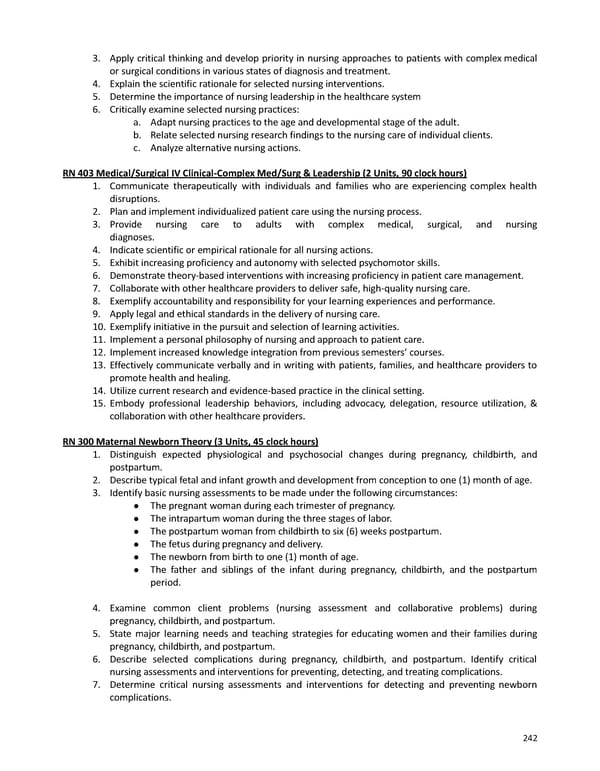3. Apply critical thinking and develop priority in nursing approaches to patients with complex medical or surgical conditions in various states of diagnosis and treatment. 4. Explain the scientific rationale for selected nursing interventions. 5. Determinetheimportanceofnursingleadershipinthehealthcaresystem 6. Critically examine selected nursing practices: a. Adaptnursingpracticestotheageanddevelopmentalstageoftheadult. b. Relate selected nursing research findings to the nursing care of individual clients. c. Analyze alternative nursing actions. RN403Medical/SurgicalIVClinical-ComplexMed/Surg&Leadership(2Units,90clockhours) 1. Communicate therapeutically with individuals and families who are experiencing complex health disruptions. 2. Plan and implementindividualized patient care using the nursing process. 3. Provide nursing care to adults with complex medical, surgical, and nursing diagnoses. 4. Indicate scientific or empirical rationale for all nursing actions. 5. Exhibit increasing proficiency and autonomy with selected psychomotor skills. 6. Demonstratetheory-basedinterventionswithincreasingproficiencyinpatientcaremanagement. 7. Collaborate with other healthcare providers to deliver safe, high-quality nursing care. 8. Exemplify accountability and responsibility for your learning experiences and performance. 9. Applylegal and ethical standards in the delivery of nursing care. 10. Exemplify initiative in the pursuit and selection of learning activities. 11. Implementapersonalphilosophyofnursingandapproachtopatientcare. 12. Implementincreasedknowledgeintegrationfromprevioussemesters’courses. 13. Effectively communicate verbally and in writing with patients, families, and healthcare providers to promotehealthandhealing. 14. Utilize current research and evidence-based practice in the clinical setting. 15. Embody professional leadership behaviors, including advocacy, delegation, resource utilization, & collaboration with other healthcare providers. RN300MaternalNewbornTheory(3Units,45clockhours) 1. Distinguish expected physiological and psychosocial changes during pregnancy, childbirth, and postpartum. 2. Describe typical fetal and infant growth and development from conception to one (1) month of age. 3. Identify basic nursing assessments to be made under the following circumstances: ● Thepregnantwomanduringeachtrimesterofpregnancy. ● Theintrapartumwomanduringthethreestagesoflabor. ● Thepostpartumwomanfromchildbirthtosix(6)weekspostpartum. ● Thefetusduringpregnancyanddelivery. ● Thenewbornfrombirthtoone(1)monthofage. ● The father and siblings of the infant during pregnancy, childbirth, and the postpartum period. 4. Examine common client problems (nursing assessment and collaborative problems) during pregnancy, childbirth, and postpartum. 5. State major learning needs and teaching strategies for educating women and their families during pregnancy, childbirth, and postpartum. 6. Describe selected complications during pregnancy, childbirth, and postpartum. Identify critical nursing assessments and interventions for preventing, detecting, and treating complications. 7. Determine critical nursing assessments and interventions for detecting and preventing newborn complications. 242
 2023-2024 | Catalog Page 241 Page 243
2023-2024 | Catalog Page 241 Page 243